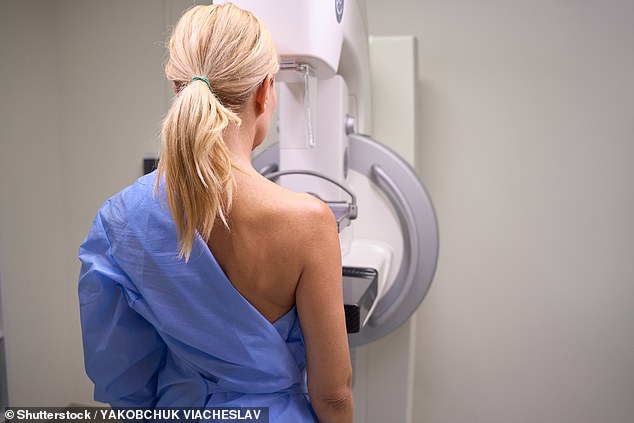My doctor tells me to stop taking HRT because I’m too old. Is this true? DR. ELLIE has the answer
I am 86 and have been taking HRT since my early 40s when I had a hysterectomy. I believe it has kept me healthy and active.
I have never broken a bone – even though osteoporosis runs in my family – and this must be down to HRT. Now my GP wants me to stop using the patches because he says I’m too old for HRT. What should I do?
Dr. Ellie Cannon replies: Doctors always exercise caution when dealing with older patients taking prescription medications, as they are more likely to experience side effects – some of which can be dangerous.
In the case of hormone replacement therapy (HRT), this can increase the risk of stroke or life-threatening blood clot.
The NHS guidelines also state that patients should use HRT for the shortest possible time, and recommend that women stop taking it every few years to find out if it makes a significant difference to their symptoms.
Doctors always exercise caution when older patients use hormone replacement therapy (HRT) because it can increase the risk of stroke or life-threatening blood clot.
However, that doesn’t mean that a woman in her eighties can’t handle it at all.
Firstly, there is no upper age limit for using HRT. Secondly, menopause treatment is supposed to be personalized for each patient.
This is because the symptoms affect women in different ways. Some women will need larger – or smaller – HRT doses than others. And there are people who benefit from taking these replacement hormones for decades, while others may only need them for a year or two.
It is also important to consider the different types of HRT available.
Patches are thought to have a lower risk of stroke than tablets, and there are also low-strength patches that contain less estrogen and can reduce this risk even further.
In addition, HRT gel is even safer than patches because it can be used in very small doses. These are all options worth discussing with a GP.
However, for anyone concerned about the risk of developing osteoporosis, it is crucial to understand that HRT – even though it has been shown to protect against the bone-thinning disease – is not the only way to prevent it. Walking can keep this at bay, as can a diet with enough calcium and vitamin D. Adults need 1,000 mg of calcium per day to reduce the risk of bone fractures.
In June I developed a rash on my feet, legs and buttocks. My doctor diagnosed me with scabies and it seems the treatment is working. However, apparently it is spread through close – often sexual – sexual contact, and I haven’t been intimate with anyone in over a year. Could this really be scabies?
Dr. Ellie answers: Scabies is a skin disease caused by a parasite called a mite. The itching is caused by the body’s reaction to the mites and their eggs on the skin.
The parasites often collect in the fingers, abdomen, genitals, arms and buttocks.
In recent years I have noticed an increase in the number of scabies patients at my GP, which suggests that it is more common than it used to be.
These mites are also slowly becoming resistant to current treatments. It’s true that it usually takes close physical contact to spread scabies. Therefore, the disease is often transmitted during sex. A brief physical touch – such as a handshake – is unlikely to lead to scabies.
However, mites can also survive for several days in humid environments. Contaminated sheets and clothing should always be washed at high temperatures to kill the mites and eggs.
The most common treatment is an antiparasitic fluid called Derbac M – also known as malathion. For most patients it is fast and effective.
Since I got a pacemaker in 2019, I have had balance problems. I feel like I’m drunk all the time. I have been seen by a neurologist who says I have no brain problems as Parkinson’s. Could my pacemaker be to blame?
Dr. Ellie answers: It is important to always go to the doctor if you have balance problems.
Not only is it a very disturbing symptom, it can also lead to falls and life-changing injuries. But pinpointing the cause can be complicated as there are several possible triggers.
For example, if the dizziness occurs when suddenly standing or sitting, it may be due to uncontrollable blood pressure.
However, pacemakers rarely have side effects.
The devices are equipped to monitor heart rate. For most who receive them, they greatly improve the quality of life and are even life-saving. However, a small percentage of patients may suffer from something known as pacemaker syndrome.
This is when the electrical activity in the heart is not properly regulated, meaning the organ does not beat as it should. As a result, people may experience dizziness, fatigue, and light-headedness. Some even faint.
Anyone who experiences balance problems after having a pacemaker fitted should consult a cardiologist to investigate the possibility of this syndrome.
There are tests that specialists can perform at the hospital to find out if the device is to blame. If this is the case, a different type of pacemaker may be used instead. A GP can make a referral to a cardiologist.
My fear if we exclude general practitioners from breast checks
I was concerned when I read about a government scheme that allows women to self-refer for breast cancer screening without first visiting a GP.
In Somerset they can call the non-emergency number 111 – or use the NHS app – to report a lump in the breast, and they will then be referred to a specialist clinic for a cancer test. If successful, the system will be rolled out across the country.

Currently, every woman registered with a GP is invited for NHS breast screening every three years between the ages of 50 and 71
I don’t support this. Delays in cancer diagnosis cost lives, and we need to speed up this process, but the vast majority of new lumps are not cancerous. Testing every morsel could lead to unnecessary invasive research and will certainly clog up NHS resources.
Do you agree? Do you believe that your breast cancer could have been diagnosed earlier if you had been able to refer yourself? Please let me know via the email address below.
Will the deathbed song bring peace?

Frank Sinatra’s My Way was chosen as one of the best songs to listen to in your final moments, as found by charity Marie Curie
I was surprised last week when end-of-life charity Marie Curie published a list of the most popular songs people want to listen to in their final moments.
My Way by Frank Sinatra, Hey Jude by the Beatles and Over The Rainbow by Judy Garland were among the top answers. I’m sure these are all great songs, but the idea of playing music at the end of life is a strange concept to me.
Sadly, I have experienced the deaths of four family members in the past year. None of them asked to play music at the end. However, that doesn’t mean it doesn’t bring peace and happiness to others.
Do you have a song you would like played on your deathbed? Did a family member ask for it? Sign up and let me know.
Do you have a question for Dr. Ellie Cannon? Email DrEllie@mailonsunday.co.uk
Dr. Cannon cannot enter into personal correspondence and her responses must be placed in a general context.
